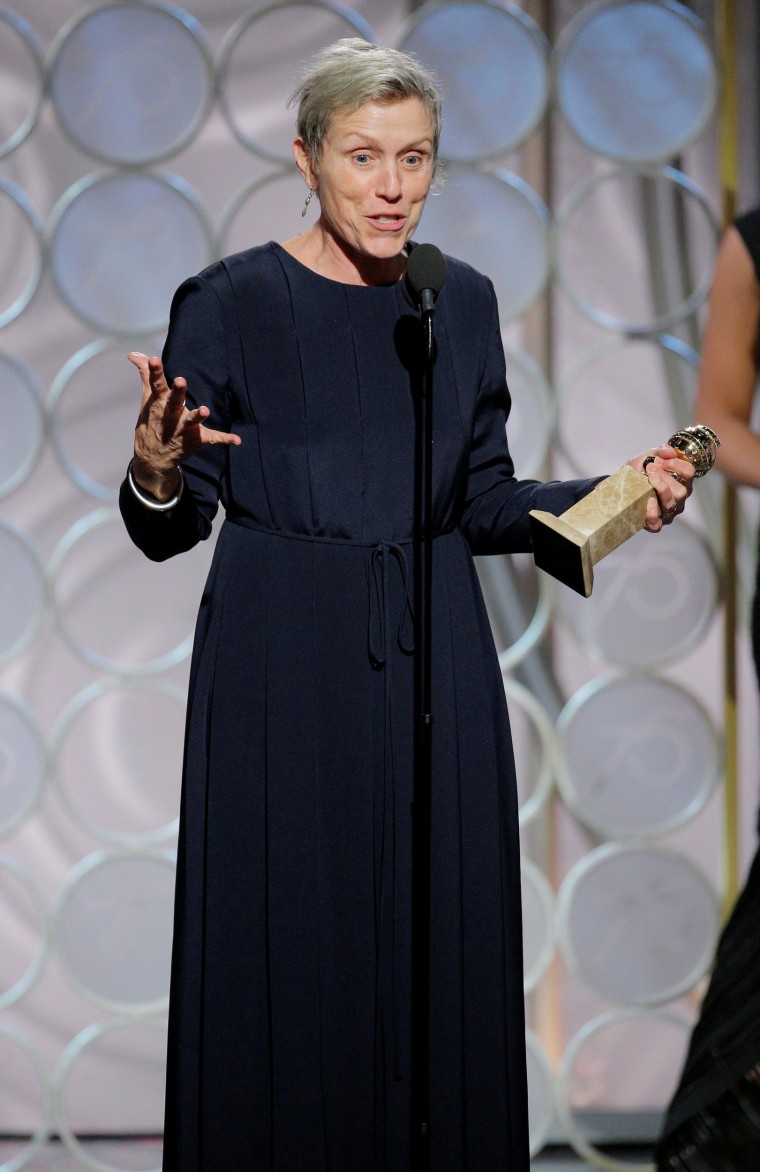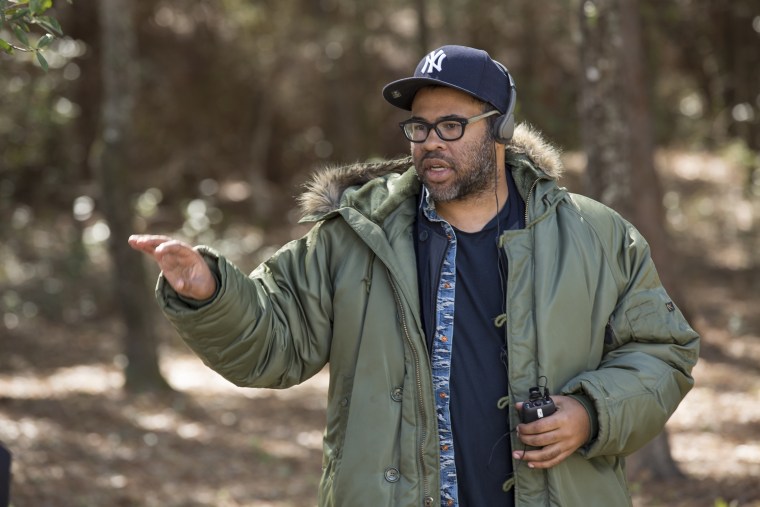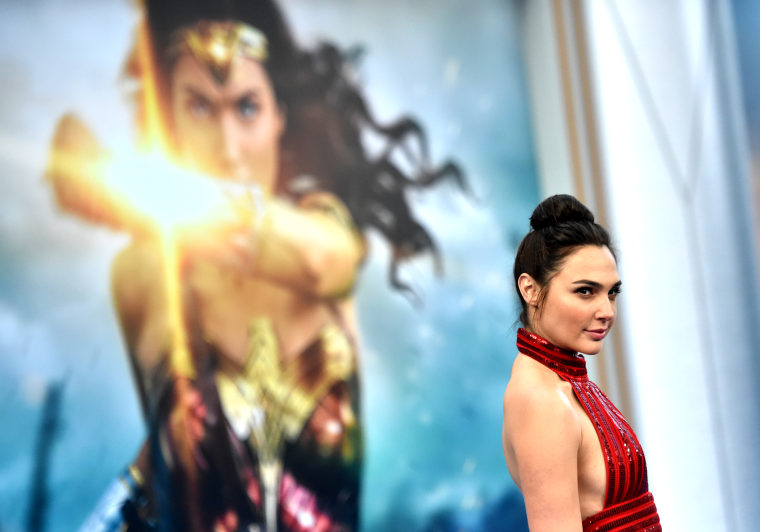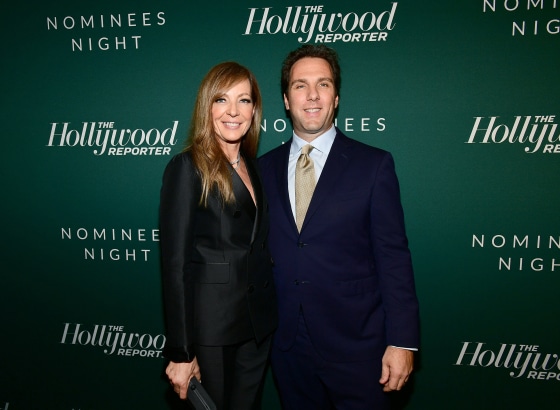The Academy Awards are set for Sunday night, the first since producer Harvey Weinstein — a constant figure at the Oscars for almost two decades — was pushed out of the industry following a series of sexual harassment and assault allegations.
Matthew Belloni, editorial director at The Hollywood Reporter, spoke with NBC News about Oscar campaign dirty tricks; the absence of Weinstein; and predictions for the show.
Q: Tell us about your Oscar week. Do you get barraged by fruit baskets?
Belloni: Oscar week is the biggest week of the year normally. Now add in the #MeToo stuff and it becomes this crazy confluence of news. And there's worldwide interest, and it's 24 hours a day.
We are constantly barraged by the movie campaigns with positive and negative information. Their clients want to be featured on the roundtables. From time to time, you will hear what's called the whisper campaigns, the weaknesses [of rival movies] and pointing out things they're "hearing" around town.
Q: What are this year's whisper campaigns?
Belloni: For instance, this year it was that "Three Billboards" is racist, or that "Shape of Water" was stolen from a playwright or it was that Gary Oldman is anti-Semitic. [Oldman apologized in 2014 for a remark to Playboy.] These are the political tactics that people use, and in the past there's evidence these whisper campaigns have been successful.
You look all the way to "Zero Dark Thirty," there was a whisper campaign about its authenticity, things that were not accurate in the film, or "Slumdog Millionaire," that the kids were mistreated. There was an allegation that the real-life subject of "A Beautiful Mind" was anti-Semitic. Everyone thought Harvey [Weinstein] was behind that.
Harvey was the ultimate campaigner and the ultimate negative campaigner, and he taught a lot of people who are now doing this professionally.
Q: Has the Oscar race been different without him?
Belloni: I think so. There is something missing. He would say, “I'd love for you to meet so-and-so. I'd love for you to meet the little kid from ‘Lion.’ ” There were always these press releases that would come out from Harvey, that the City of Los Angeles has declared today “The Artist” day, like a fake film festival that would only give awards to Harvey Weinstein.
Q: He really dominated the campaigning?
Belloni: In recent years it was more reserved, and now all the other campaigns are just as sophisticated. Everyone has caught up, and you see the stunts and all the things Harvey popularized.
Q: Why is the best picture a wide-open race this year?
Belloni: There are two things at work. There is no one film that the academy has coalesced around. Typically people talk and the momentum gets behind one or two movies, and it becomes a showdown. This year, because there isn't that one movie that everyone loves, or the increasing diversification of the academy, there are five movies that legitimately could win best picture and each have their backers: "Shape of Water," "Get Out," "Lady Bird," "Dunkirk" and "Three Billboards."

Q: Are any of those best pictures in your mind?
Belloni: I'm not a critic, and I reserve my personal opinions for my wife and occasionally I'll tweet about a movie I really liked. I do know talking to academy voters that the favorite is "Shape of Water," but I would absolutely not be surprised if "Get Out" wins. I feel like there was a late push, and people think it's the most important movie of the year.
Q: Do you think it’s appropriate, whether on the red carpet or during the ceremony, to address politics?
Belloni: I understand why people don't like it, but I also understand why people who feel strongly about their beliefs would use a powerful platform to get their message across. The Oscars is the biggest platform of the year. There is a history of the entertainment industry leading on certain social issues.
There is a balance. Plus, in a way, it makes it interesting, bigger than just some statues for movies. Oprah's speech at the Golden Globes influenced what everybody in America was talking about. That was a powerful speech. She knew exactly what she was doing.

Q: What will the Oscar producers do differently this year?
Belloni: It's the same team as last year, but they just have this gigantic elephant in the room that they have to address. The Golden Globes really leaned in.
Q: Can we talk about the different movements and whether the academy's new, broader membership has affected the movies that get picked? Is Hollywood becoming less white male and more diverse?
Belloni: It is still overwhelmingly male and overwhelmingly white. However, over the past three years the number of people who have been invited to the academy has dramatically increased. The academy has made a significant push to diversify not just by gender but by race and nationality. There are more foreign members as well.
So consequently, with the electorate changing, the nominees are going to change. I strongly believe that five years ago, if it was the same choice between "Moonlight" and "La La Land" that "La La Land" would have won. The diversification and the age of the audience coming down, they're more open in my view to nontraditional Oscar best pictures. That is why I think "Get Out" has a shot.
Q: Why don't the movies I see at the multiplex ever get nominated?
Belloni: The academy increased the number of best pictures from five to as many as 10. The thinking was this will allow the bigger, more popular and populist movies to get a best-picture nomination. In reality, it’s been more of the same. It's allowed more of these smaller art house movies that the academy members love, but the public doesn't, to get in.

The argument on the other side is "Wonder Woman" doesn't need the Oscars to get people to know it's a good movie, but "Shape of Water," and "Three Billboards" and "Darkest Hour," those are the kind of movies people aren't going to discover unless they get awards attention. And all of those movies have passed $100 million in box office, so people are seeing those movies and they're seeing them because they're in the awards competition.
I have mixed feelings about that. I would like to see movies like "Wonder Woman" and "Black Panther," really well-executed mainstream entertainment, I'd love to see them get into the Oscar race, but I understand why the academy thinks the way they do.
